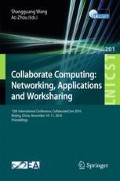Abstract
Energy constraint of sensor nodes is a key problem in WSN. Energy-based routing mechanism can significantly prolong the lifetime of sensor networks, but the current researches do not consider the number of service objects of a senor node. In this paper, we propose a routing model based on service degree and residual energy, named SERM. We put forward the node service degree to represent the service scale of some node, and the path service efficiency to show the path’s service capability. Then, a multi-path transmission system of wireless sensor networks is designed based on the 2-dimension: the service degree and the residual energy of nodes. Finally, the simulation experiments using OPNET prove that SERM can prolong the network lifetime and collect more sensor data.
Access this chapter
Tax calculation will be finalised at checkout
Purchases are for personal use only
References
Liu, M., Cao, J.N., Zheng, Y., Chen, L.J., Xie, L.: Analysis for multi-coverage problem in wireless sensor networks. J. Softw. 18(1), 127–136 (2007)
Kaur, R., et al.: Optimized cluster based deployment of sensor nodes to enhance the network lifetime in wireless sensor network. In: Fifth International Conference on Advanced Computing & Communication Technologies (ACCT), pp. 658–665. IEEE Computer Society (2015)
Yao, Y., Cao, Q., Vasilakos, A.V.: EDAL: An energy-efficient, delay-aware, and lifetime-balancing data collection protocol for heterogeneous wireless sensor networks. IEEE/ACM Trans. Netw. 23(6), 810–823 (2015)
Lee, A., Ra, I.: Adaptive-gossiping for an energy-aware routing protocol in wireless sensor networks. In: International Conference on Wireless Communications & Mobile Computing, pp. 1131–1135. ACM (2010)
Rachamalla, S., Kancharla, A.S.: Power-control delay-aware routing and MAC protocol for wireless sensor networks. In: IEEE International Conference on Networking, Sensing & Control, pp. 527–532 (2015)
Zaman, N., Low, T.J., Alghamdi, T.: Enhancing routing energy efficiency of wireless sensor networks. In: International Conference on Advanced Communication Technology (ICACT), pp. 587–595. IEEE (2015)
Chang, J.H., Tassiulas, L.: Maximum lifetime routing in wireless sensor networks. IEEE/ACM Trans. Netw. 12(4), 609–619 (2004)
Han, K.H., Ko, Y.B., Kim, J.H.: A novel gradient approach for efficient data dissemination in wireless sensor networks. In: IEEE Vehicular Technology Conference, pp. 2979–2983 (2004)
Chiang, S.S., Huang, C.H., Chang, K.C.: A minimum hop routing protocol for home security systems using wireless sensor networks. IEEE Trans. Consum. Electron. 53(4), 1483–1489 (2007)
Akyildiz, I.F., Su, W., Sankarasubramaniam, Y., et al.: Wireless sensor networks: A survey. Comput. Netw. 38(4), 393–422 (2002)
Wang, W., Li, Y., Li, H.S., et al.: The analysis of link availability for directional routing in mobile ad hoc network. In: International Conference on Computer Application and System Modeling (ICCASM), pp. 353–356. IEEE (2010)
Shah, R.C., Rabaey, J.M.: Energy aware routing for low energy ad hoc sensor networks.In: Wireless Communications and Networking Conference, pp. 350–355. IEEE (2002)
Wei, M., Huang, X., Wu, C., et al.: Network coding based energy-efficient multi-path routing for wireless sensor network. In: International Conference on Advances in Mobile Computing & Multimedia, pp. 240–244. ACM (2012)
Qi, X.G., Wang, H.F., Zheng, G.Z., Xie, M.D., Duan, L.: Analysis on resilience of wireless sensor networks growth model. J. Softw. 25(1), 131–138 (2014). (in Chinese)
Mak, N.H., Seah, W.K.G.: How long is the lifetime of a wireless sensor network? In: International Conference on Advanced Information Networking & Applications, pp. 763–770. IEEE (2009)
Acknowledgment
This research is supported by the National Natural Science Foundation of China (Nos.61373161, 61502320, 61300171), Youth Backbone of Beijing Outstanding Talent Training Project (No. 2014000020124G133), and the Fundamental Research Project of Shenzhen Municipality (No.JCYJ20160228172531429).
Author information
Authors and Affiliations
Corresponding author
Editor information
Editors and Affiliations
Rights and permissions
Copyright information
© 2017 ICST Institute for Computer Sciences, Social Informatics and Telecommunications Engineering
About this paper
Cite this paper
Sun, Z., Chen, W., Tang, X., Hu, G. (2017). Routing Model Based on Service Degree and Residual Energy in WSN. In: Wang, S., Zhou, A. (eds) Collaborate Computing: Networking, Applications and Worksharing. CollaborateCom 2016. Lecture Notes of the Institute for Computer Sciences, Social Informatics and Telecommunications Engineering, vol 201. Springer, Cham. https://doi.org/10.1007/978-3-319-59288-6_33
Download citation
DOI: https://doi.org/10.1007/978-3-319-59288-6_33
Published:
Publisher Name: Springer, Cham
Print ISBN: 978-3-319-59287-9
Online ISBN: 978-3-319-59288-6
eBook Packages: Computer ScienceComputer Science (R0)

